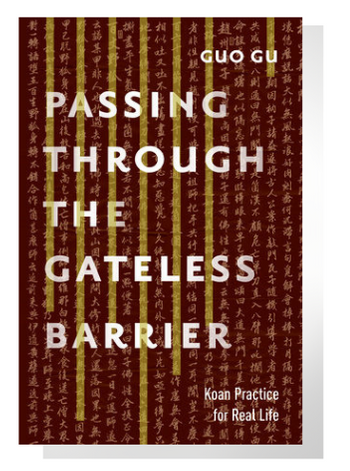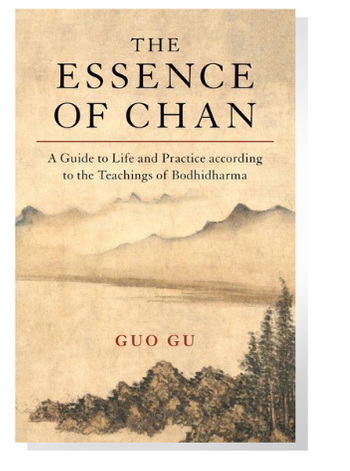Articles by Guo Gu:
- Overcoming Despair (2024)
- What is Helpful? What is Harmful? (2024)
- Awakening Through Sound (2023)
- Glimpses of Buddhanature (2023)
- Virtue, Meditation, Wisdom (2022)
- The Practice of Wonderment (2021)
- How Do We Create Reality? (2021)
- Meditation Q&A with Guo Gu (2021)
- Visiting Teacher: Q&A with Guo Gu (2021)
- The Empty Room (2021)
- Chan Practice of Mindfulness (2019)
- Dharma Practice in an Age of Technological Dystopia (2018)
- Integrating Yogacara in Your Practice (2017)
- Exposing, Embracing, Responding and Letting Go (2016)
- The Path to Where You Are (2015)
- Silent Illumination (2014)
- Silent Illumination – Printed in Embodied Philosophy (2014)
- Newtown and the Three Poisons (2013)
- You are Already Enlightened (2012)
Suggested Readings:
Click Here for Guo Gu’s Suggested Reading List
DDMBA Free Booklets:
Newsletter:
Special Edition Newsletter for the 5th Year Anniversary, Click Here
Tallahassee Chan Center Newsletter, Issue 2
Tallahassee Chan Center Newsletter, Issue 1
Books:
Below are a list of Master Sheng Yen’s and Guo Gu’s books in English. All books can be purchased from your local or online bookstores, or directly from the publishers. We provide links to brief descriptions of these books.
 Silent Illumination: A Chan Buddhist Path to Natural Awakening
Silent Illumination: A Chan Buddhist Path to Natural Awakening
By Guo Gu
Our natural awakening—or buddha-nature—is inherent within all of us and waiting to be realized. Buddha-nature has the qualities of both silence and illumination, and by working with silent illumination meditation you can find your own awakening. Distinguished Chan Buddhist teacher Guo Gu introduces you to the significance and methods of this practice through in-depth explanations and guided instructions. To help establish a foundation for realizing silent illumination, he has translated twenty-five teachings from the influential master Hongzhi Zhengjue into English, accompanied by his personal commentary. This book will be an indispensable resource for meditators interested in beginning or deepening their silent illumination practice.
 Passing Through the Gateless Barrier: Kōan Practice for Real Life
Passing Through the Gateless Barrier: Kōan Practice for Real LifeBy Guo Gu
The classic thirteenth-century collection of Zen kōans with one of the most accessible commentaries to date, from a Chinese Zen teacher. Gateways to awakening surround us at every moment of our lives. The whole purpose of kōan (gong’an, in Chinese) practice is to keep us from missing these myriad opportunities by leading us to certain gates that have traditionally been effective for people to access that marvelous awakening. The forty-eight kōans of the Gateless Barrier (Chinese: Wumenguan; Japanese: Mumonkan) have been waking people up for well over eight hundred years. Chan teacher Guo Gu provides here a fresh translation of the classic text, along with the first English commentary by a teacher of the Chinese tradition from which it originated. He shows that the kōans in this text are not mere stories from a distant past, but are rather pointers to the places in our lives where we get stuck—and that each sticking point, when examined, can become a gateless barrier through which we can enter into profound wisdom.
 The Essence of Chan
The Essence of ChanBy Guo Gu
The Essence of Chan is a commentary on the legendary founder Bodhidharma’s text, “Two Entries and Four Practices.” This short scripture contains the marrow, or essence, of all his teachings. Chan teacher Guo Gu offers a translation of this significant text, as well as an elaboration on how the teachings can be applied to life. The book is a nonsectarian guide of immense practical help for all Dharma practitioners. This book is offered in an e-book format and also in paperback.
 Attaining the Way
Attaining the WayBy Chan Master Sheng Yen
Translated by Guo Gu
This is an inspiring guide to the practice of Chan (Chinese Zen) in the words of four great masters of that tradition. It includes teachings from contemporary masters Xuyun and Sheng Yen, and from Jiexian and Boshan of the Ming Dynasty (1368–1644). Though the texts were written over a period of hundreds of years, they are all remarkably lucid and are perfect for beginners as well as more advanced practitioners today. All the main points of spiritual practice are covered: philosophical foundations, methods, approaches to problems and obstacles—all aimed at helping the student attain the way to enlightenment.
 Complete Englightenment
Complete Englightenment
By Chan Master Sheng Yen
Forward by Thich Nhat Hanh
Translated by Guo Gu
Complete Enlightenment is the first authoritative English translation and commentary on The Sutra of Complete Enlightenment, a central Mahayana text that shaped the development of East Asian Buddhism and Chan. Master Sheng Yen incisively applies the sutra to practice in contemporary life. The central theme of this book consists of penetrating dialogues between the Buddha and twelve illustrious bodhisattvas on the nature of enlightenment. Each of the bodhisattvas is an enlightened being who epitomizes the ideals of Mahayana Buddhism, the Middle Way of vowing to help all sentient beings while on the path to buddhahood.
“The Sutra of Complete Enlightenment is a Dharma dialogue between the Buddha and several great bodhisattvas in the presence of a large Sangha. If you know how to be there and how to listen, you will be able to actually participate in it. It is still going on.”–Thich Nhat Hanh
 Dharma Drum
Dharma Drum
By Chan Master Sheng Yen
Edited by Guo Gu
In Dharma Drum, Master Sheng Yen offers fresh insights into the ways we can bring Chan study and practice into our daily lives. Part One includes anecdotal explanations of the history and concepts that shaped Chan Buddhism, along with careful explanations of methods for meditation and other practices. Part Two pulls us into the rhythms of practice itself, with aphorisms and bits of guidance for people at any level of practice.
“In Buddhism, awakening from the long dream of life means realizing your self-nature. … Although we may understand that our lives are dreamlike, we still bear responsibility for this sleeping and waking dream”. — Chan Master Sheng Yen
 Faith in Mind
Faith in Mind
By Chan Master Sheng Yen
In Faith in Mind Chan Master Sheng Yen (b. 1930) comments on the revered Chinese Buddhist text, the Xinxin Ming (Faith in Mind), by the third patriarch of Chan, Sengcan (d. 606 C.E.). Only a few pages long, the Xinxin Ming expresses profoundest truths about the enlightened mind. Master Sheng Yen approaches this poem as more than philosophy; he also sees it as a practical guide to meditation practice. He says, “True faith in mind is the belief grounded in realization that we have a fundamental, unmoving, and unchanging mind. This mind is precisely buddha-mind”.
 Footprints in the Snow
Footprints in the Snow
By Chan Master Sheng Yen
In this landmark memoir, a renowned Buddhist master traces his spiritual journey against the panoramic story of China from the pre-Communist era to the present.
Master Sheng Yen has devoted much of his life to spreading the teachings of Chinese Buddhism—a practice that antedates the more familiar Japanese and Tibetan traditions—throughout the world. He became known in the United States after he began founding meditation centers here in 1980. Now in his late seventies, he tells the remarkable story of his life and spiritual education in Footprints in the Snow. From descriptions of the private world of Buddhist masters to first-hand accounts of Chinese history, it is a rare document that is both an important look at China’s past and a compelling spiritual journey across a lifetime. Sheng Yen’s story is of a life lived in the last years of the Republic of China, the Sino-Japanese War, and the founding of the People’s Republic of China. An eye-opening slice of modern history as well as an authoritative introduction to an ancient religious tradition, Footprints in the Snow will appeal to spiritual seekers, travelers who want to understand more about China, or anyone looking for a fascinating story.
 Getting the Buddha Mind
Getting the Buddha Mind
By Chan Master Sheng Yen
“In meditation, we go from phenomena to emptiness by progressively voiding our mental states”. This sentence from Getting the Buddha Mind succinctly summarizes the purpose of practicing Chan meditation. What does it mean? This slim volume, now in its third printing, provides some of the answers to the question of how the practice of Chan retreat is integral to the path of realizing “emptiness” — the enlightened state of bodhi, or Buddha Mind. Compiled from lectures by Master Sheng Yen during 7-day retreats in New York City and Long Island, this volume is recommended for beginning as well as seasoned practitioners of Chan and Zen Buddhism.
 Hoofprint of the Ox: Principles of the Chan Buddhist Path as Taught by a Modern Chinese Master
Hoofprint of the Ox: Principles of the Chan Buddhist Path as Taught by a Modern Chinese Master
By Chan Master Sheng Yen
Drawing its title from the famous ox-herding pictures that symbolize enlightenment as the search by an ox-herder for his wayward ox, Hoofprint of the Ox is an inspirational guide to the self-discovery that is possible through Chan practice. Master Sheng Yen shares his wisdom and teachings in this first comprehensive English primer of Chan — the Chinese tradition of Buddhism that inspired Japanese Zen. Often misunderstood as an obscure system of paradoxes, the Chan path leads to enlightenment through apparent contradiction. While demanding the discipline of traditional Buddhism, Chan asserts that wisdom (Buddha-nature) is innate and immediate in all living beings, and thus not achieved through the strictures of religious practice, but through dropping all attachments and clinging that obscure our true self-nature.
 lluminating Silence: The Practice of Chinese Zen
lluminating Silence: The Practice of Chinese Zen
By Chan Master Sheng Yen
This comprehensive work provides an unusual introduction to the practice of Chan by Master Sheng Yen based on talks given during two intensive retreats at the meditation center of the Western Chan Fellowship in Wales. It provides a basic handbook for all concerned with an effective training of Chan for the West with especial reference to the little known practice of Silent Illumination. In his foreword Stephen Batchelor writes: “The discourses are lucid and direct, drawn widely on the sources of Chinese Buddhism, and speak in a refreshingly modern idiom. Perhaps because the settings were relatively small and intimate, the gentleness, warmth and humor of Master Sheng Yen radiate throughout the text”.
 Method of No Method
Method of No Method
By Chan Master Sheng Yen
Translated by Guo Gu
Here is a spiritual practice uncomplicated enough for anyone to learn, yet rich enough to be worked with for a lifetime. The traditional Chan (Chinese Zen) practice called Silent Illumination begins with nothing more than putting aside all thoughts except the awareness of oneself “just sitting.” It’s so simple in execution that it has sometimes been called the “method of no-method”—yet simple as it is, the practice is subtle and profound, with the potential for ever subtler refinements as the practitioner moves toward mastery of it. When fully penetrated, this radical form of emptying one’s busy mind-stream leads to perception of the vast ocean of pure awareness.
 Orthodox Chinese Buddhism
Orthodox Chinese Buddhism
By Chan Master Sheng Yen
As a long-time monk, scholar, and founder of monasteries in Asia and North America, Master Sheng Yen is uniquely qualified to explain the correct — therefore “orthodox” — beliefs that have guided Chinese Buddhism for over 1,500 years. Written while the author was on solitary retreat, OCB was Master Sheng Yen’s response to many questions he received about Chinese Buddhism. Using a question-and-answer format, the book explores a wide range of subjects, from what it means to be a Buddhist to sudden enlightenment. This English translation is therefore a welcome addition to the Western literature of Buddhism, and includes new annotations, appendixes, and a glossary designed for the Western reader.
 Song of Mind: Wisdom from the Zen classic Xin Ming
Song of Mind: Wisdom from the Zen classic Xin Ming
By Chan Master Sheng Yen
“No words can explain enlightenment,” says the seventh-century Chan classic Xin Ming (Song of Mind) by Chan Master Farong (594-657). Even so, this poem wonderfully expresses what cannot be expressed in words. In his commentary, Master Sheng Yen takes the austere language of the Xin Ming and reveals to us its still-vital inner meanings. But his ultimate purpose is practical: to show us how to approach Chan meditation, how to deal with problems arising in practice, and how to integrate Chan into every aspect of one’s life. The book is based on a series of 7-day intensive Chan retreats with Master Sheng Yen that took place over several years. Each chapter consists of a commentary by Master Sheng Yen on a section of the poem, thus guiding us stanza-by-stanza through this classic of Chan literature. The result is an intimate feeling of being there as he brings this classic to life.
 The Infinite Mirror
The Infinite Mirror
By Chan Master Sheng Yen
Here is the inimitable Master Sheng Yen at his best, illuminating the ancient texts of the Chinese Zen tradition to show how wonderfully practical they really are, even for us today. The texts, written by two of the founders of the Ts’ao-tung sect of Chan Buddhism, are poems entitled Inquiry into Matching Halves and Song of the Precious Mirror Samadhi. Both emphasize the Chan view that wisdom is not separate from vexation, and both speak of the levels of awareness through which one must pass on the way to realization. Both are also works of Buddhist philosophy that can serve as guides to spiritual practice for anyone.
 Subtle Wisdom
Subtle Wisdom
By Chan Master Sheng Yen
Master Sheng Yen, a Dharma descendant of the founders of Buddhism in China, considers the concepts of suffering, enlightenment, and, compassion, and briefly recaps the history of Buddhism in China. But he goes beyond these issues to discuss contemporary matters and questions he has encountered in his years of teaching in the United States. Sometimes personal and always instructive, Sheng Yen’s introductory work is perfect for those just coming to Buddhism, and for those who are already very familiar with the Tibetan and Zen schools.
 The Poetry of Enlightenment
The Poetry of Enlightenment
By Chan Master Sheng Yen
“To my knowledge there are no anthologies of Chan poetry in Chinese, Japanese or English which describe in detail the method of practice and the experience of Chan. Furthermore, there are few prose sources in English dealing with the same topics. The purpose of these poems is to specifically show you how to practice, what attitudes to cultivate and what pitfalls to beware of. Finally, they attempt to describe the ineffable experience of Chan itself. These poems flow directly from the minds of the enlightened Chan masters. They include works by Shih Wang Ming, Master Fu, Seng Ts’an, Niu T’ou Fa Jung, Yung Chia Hsuan Chueh, Shih T’ou Hsi Ch’ien, Tung Shan Liang Chieh, and Han Shan Te Ch’ing.” We get a glimpse into their experience at the time of, and after their enlightenment. — Chan Master Sheng Yen
 The Sword of Wisdom: A Commentary on the Song of Enlightenment
The Sword of Wisdom: A Commentary on the Song of Enlightenment
By Chan Master Sheng Yen
The Sword of Wisdom is an insightful commentary by Master Sheng Yen on the Song of Enlightenment, a classic Chan poem by Master Yung-chia (618-907) that speaks of the proper methods and attitudes of Chan (Zen) practice. In the deepest sense however, the Song of Enlightenment is no less than a roadmap to enlightenment. Yung-chia speaks of the thoroughly enlightened person as someone who has “nothing to learn and nothing to do”. In his commentary to Yung-chia’s poem, Master Sheng Yen explains to us what that means and what a practitioner should do to attain the freedom of mind that the poem celebrates. Compiled from a series of lectures delivered during intensive 7-day meditation retreats, Master Sheng Yen’s lucid commentary offers fresh insights into a timeless philosophy that will benefit and inspire all those interested in Buddhism.
 There is No Suffering: A Commentary on the Heart Sutra
There is No Suffering: A Commentary on the Heart Sutra
By Chan Master Sheng Yen
There Is No Suffering is Chan Master Sheng Yen’s commentary on the Heart Sutra, the most widely recited and studied among the Mahayana scriptures. Only some two pages long in English translation, the Heart Sutra evokes the complete spirit of Mahayana Buddhism, which is that while phenomena exist they are fundamentally transient and without enduring self, that underlying all sentient experience is “true suchness”, or Buddha-nature. Master Sheng Yen speaks about the sutra from the point of view of Chan practice and presents it as a series of contemplations, encouraging readers to experience it directly through meditation and daily life. In this way, experiencing the Heart Sutra is not merely intellectual, but also method of contemplating our own reality and ultimately awakening to our own inherent Buddha-nature.
 Zen Wisdom
Zen Wisdom
By Chan Master Sheng Yen
In Zen Wisdom Chan Master Sheng Yen answers questions from his students with clarity, humor, and depth. Collected over several years, these conversations focus on the simple yet seemingly elusive principles of Chan (Zen) practice. The questions deal not only with the philosophical foundations of Buddhism, such as “What is the self?” but also with issues such as how to practice meditation in daily life. Combining Buddhist wisdom with informed knowledge of contemporary life, Master Sheng Yen shows us that the Buddha’s teachings are still fresh and relevant today.

